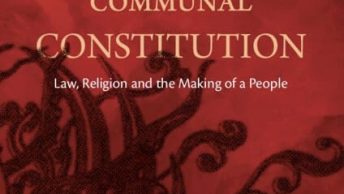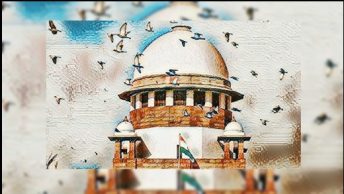The students at The West Bengal National University of Juridical Sciences, Kolkata (‘NUJS’) are pleased to announce the release of Issue 13(2) of the NUJS Law Review on their website.
This Issue is of particular significance to them as they have respectfully dedicated this Issue to the memory of Prof. (Dr.) Shamnad Basheer, marking just over a year of the loss of a brilliant scholar, a skilled practitioner, a devoted friend, and a thoughtful teacher. As a renowned scholar of Intellectual Property Law, he played a pivotal role in the development of jurisprudence in the field, with his notable contribution to the landmark Novartis v. Union of India judgement, as well as his development of SpicyIP, a prolific open-access blog. His scholastic achievements, such as winning the Stanford Technology Review Essay Competition, and co-editing a book on the subject of IP Law, are only eclipsed by his efforts to make Legal Education in India more accessible and diverse. He founded ‘Increasing Diversity By Increasing Access to Legal Education’ (IDIA), a movement that has taken unprecedented steps towards the removal of barriers of entry in legal education. His time at NUJS has left an indelible mark on the institution, and his thoughts continue to mould a culture of progressive inclusivity.
This issue contains articles from professionals, students, and scholars, who have contributed to various areas of contemporary relevance in the law. Following are the articles published in the Issue:
- In Memoriam: Late Prof. (Dr.) Shamnad Basheer by Prof. (Dr.) N.K. Chakrabarty (Vice-Chancellor, National University of Juridical Sciences, Kolkata), Deepak Raju (Senior Associate, Sidley Austin LLP, Geneva; Guest Faculty for Settlement of International Disputes course at NUJS; B.A. LL.B. (H.), National University of Juridical Sciences, Kolkata (2011)) & Rishabh Mohnot, (Prof. Chakrabarty is Vice-Chancellor, National University of Juridical Sciences, Kolkata. Deepak Raju is a Senior Associate at Sidley Austin LLP, Geneva. He is an NUJS Alumnus of 2011 batch and is also a Guest Faculty at NUJS for the course on Settlement of International Disputes. Rishabh Mohnot is an NUJS Alumnus of 2020 Batch)
- Editorial Note: A Court Beyond the Jurisdiction of Truth: Reflections in Light of the Prashant Bhushan Contempt Case by Aashesh Singh and Isana Laisram (Editors, NUJS Law Review). The authors examine the role of the truth defence in criminal contempt and address the reluctance of the judiciary in engaging with this defence, as evinced in the Prashant Bhushan contempt Case.
- Article: Preventive Detention, Habeas Corpus and Delay at the Apex Court: An Empirical Study by Shrutanjaya Bhardwaj (Practising Advocate in Delhi; LL.M., University of Michigan Law School (2019); B.A. LL.B. (H.), National Law University, Delhi (2017)). In this paper, he presents an empirical analysis of the delay in adjudication of habeas corpus petitions in preventive detention cases at the Supreme Court of India. Studying all reported habeas corpus judgments of the Supreme Court in the twenty-year period from 2000 to 2019, he argues delays render the writ meaningless in several cases.
- Article: Reconceptualising Parenthood: A Model Regulatory Framework for Assisted Reproduction in India by Aastha Malhotra and Arshia Roy (4th and 3rd year students of law at the West Bengal National University of Juridical Sciences, Kolkata.) They analyse three assisted reproductive techniques – surrogacy, in-vitro fertilisation, and genetic manipulation, and their implications for public health rights, gender justice, sexual rights, disability rights, child rights, and bioethics. Through this analysis, they argue that a binding legal framework that can protect interests and rights of medical professionals, infertile individuals or couples, children born as a result of assisted reproduction, donors and surrogates, is required. From a study of the existing regulatory framework, the authors suggest a model uniform legislation to regulate the three techniques.
- Article: Unjust Citizenship: The Law That Isn’t by Professor Dipika Jain and Kavya Kartik (Professor Jain is Professor of Law, Vice Dean (Research) and Founding Executive Director, Centre for Health Law, Ethics and Technology, Jindal Global Law School. Kavya Kartik is Assistant Director, Centre for Health Law, Ethics and Technology, Jindal Global Law School.) They argue that the State is able to inflict violence on transgender persons by implementing regulatory frameworks that are paternalistic, cis-heteronormative and detrimental to transgender persons’ basic identity. This takes the form of the Transgender Persons (Protection of Rights) Act, 2019 and Draft Rules, which violate fundamental rights of transgender persons, and medicalise trans identities on the pretext of biological determinism. The second part of the article juxtaposes this against the arbitrary citizen structures created by the State through the Citizenship Amendment Act, 2019 -– National Register of Indian Citizens nexus. The authors conclude by arguing that the compounded effect of these frameworks results in nothing but performative citizenship.
- Article: Not a Numbers Game: A Constitutional Argument to increase coverage under The National Food Security Act, 2013 by Asmita Singh (Advocate-on-Record, Supreme Court of India; LL.M., Columbia Law School (2014), B.A. LL.B (H), National Law Institute University, Bhopal (2010)) and Gautam Narayan (Advocate-on-Record, Supreme Court of India; LL.B., Univerisity of Delhi (2001); Economics (H) University of Delhi, (1997)). They undertake a Constitutional scrutiny of §9 of the National Food Security Act, 2013. They argue, inter-alia, that artificial exclusions created by the reliance of §. 9 of the Act on Census data has served to exacerbate the heartrending human tragedies that have been wrecked on the most marginalized persons. Against this backdrop, they use the COVID-19 Pandemic as a case study to propose some structural reforms to the NFSA. They conclude by emphasizing on how relief measures for protection against hunger and starvation during circumstances as dire as the pandemic have become conditional on ration cards.
- Note: Decoding the Tribunal’s Power to Grant Waiver under §244 of The Companies Act, 2013 by Ananya Verma, Kamakshi Puri, & Mehr Sidhu (All authors have received B.A LL.B degrees from Jindal Global Law School this year). They examine the circumstances under which the National Company Law Tribunal may grant a waiver of the locus requirement under §244 of the Companies Act, 2013, in an application for relief against oppression and mismanagement. The authors explore the factors warranting the grant of such a waiver, with a particular emphasis on Cyrus Investments v. Tata Sons (2017) to argue that the legislature should consider a qualitative threshold based on a case-to-case assessment of claims in place of the existing quantitative one.
Additionally, they have launched a newsletter by the name of the NUJS Monthly Digest. You can have a look at the latest August issue here, and sign up to receive future issues of the newsletter using this form.






Can you be more specific about the content of your article? After reading it, I still have some doubts. Hope you can help me.
Thanks for sharing. I read many of your blog posts, cool, your blog is very good.